BUS1044 Business Law Assignment: Partnership, Agency, and Liability
VerifiedAdded on 2022/09/16
|5
|1020
|25
Homework Assignment
AI Summary
This document presents a comprehensive solution to a Business Law assignment, likely for a course at George Brown College (BUS1044). The assignment addresses key concepts including fiduciary duty in partnerships (both general and limited), the liabilities of partners, and the implications of an agent's actions on the principal. The solution explores scenarios involving breach of fiduciary duty, and liability for a partner's actions, and the requirements for severance pay. The assignment also delves into the responsibilities of principals and agents, particularly in situations where an agent exceeds their authority. Finally, the assignment analyzes the legal status of independent contractors and the limited liability of the corporation. The provided answers are well-structured, supported by legal principles and relevant case law, and include citations from legal textbooks and academic articles.
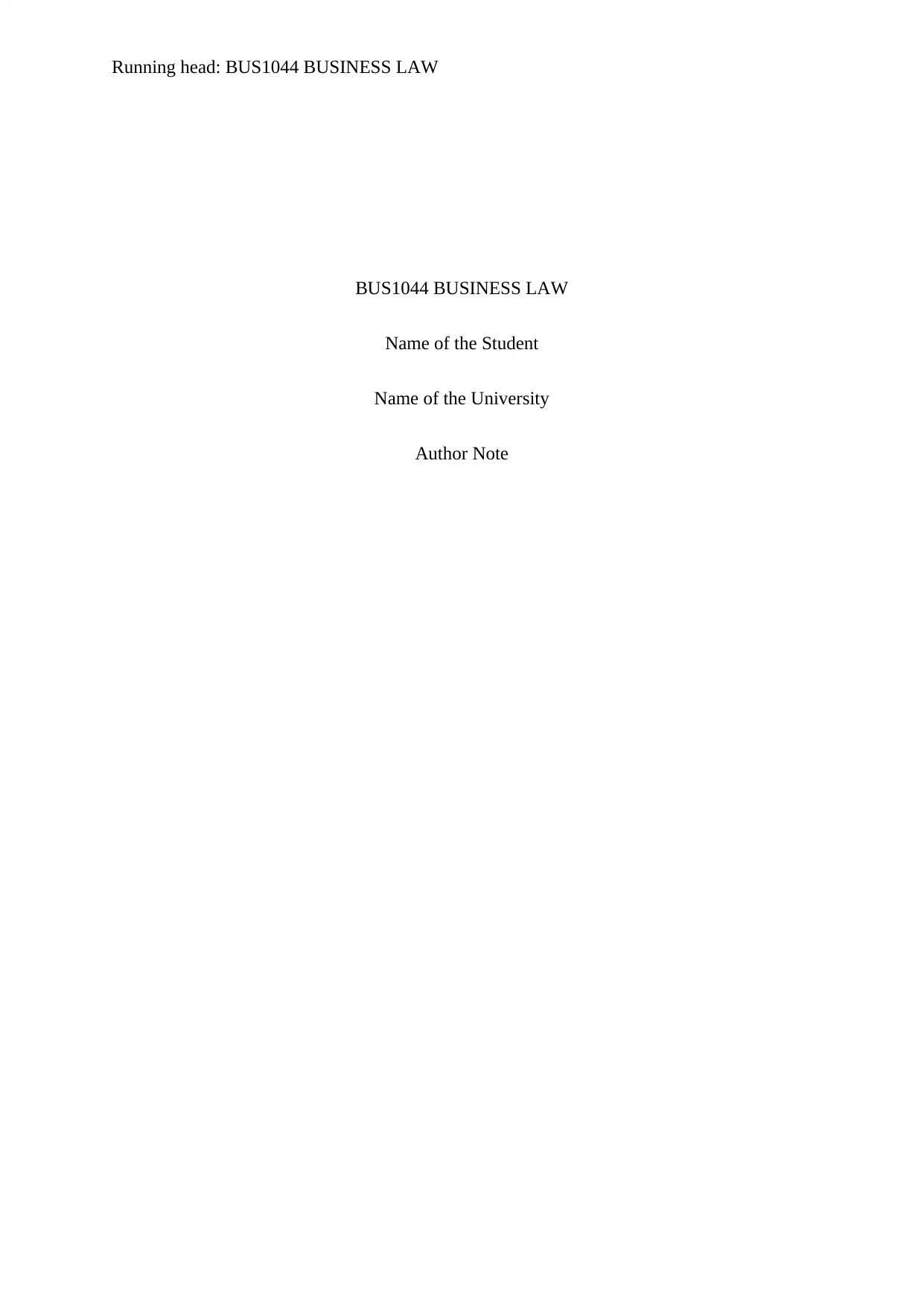
Running head: BUS1044 BUSINESS LAW
BUS1044 BUSINESS LAW
Name of the Student
Name of the University
Author Note
BUS1044 BUSINESS LAW
Name of the Student
Name of the University
Author Note
Paraphrase This Document
Need a fresh take? Get an instant paraphrase of this document with our AI Paraphraser
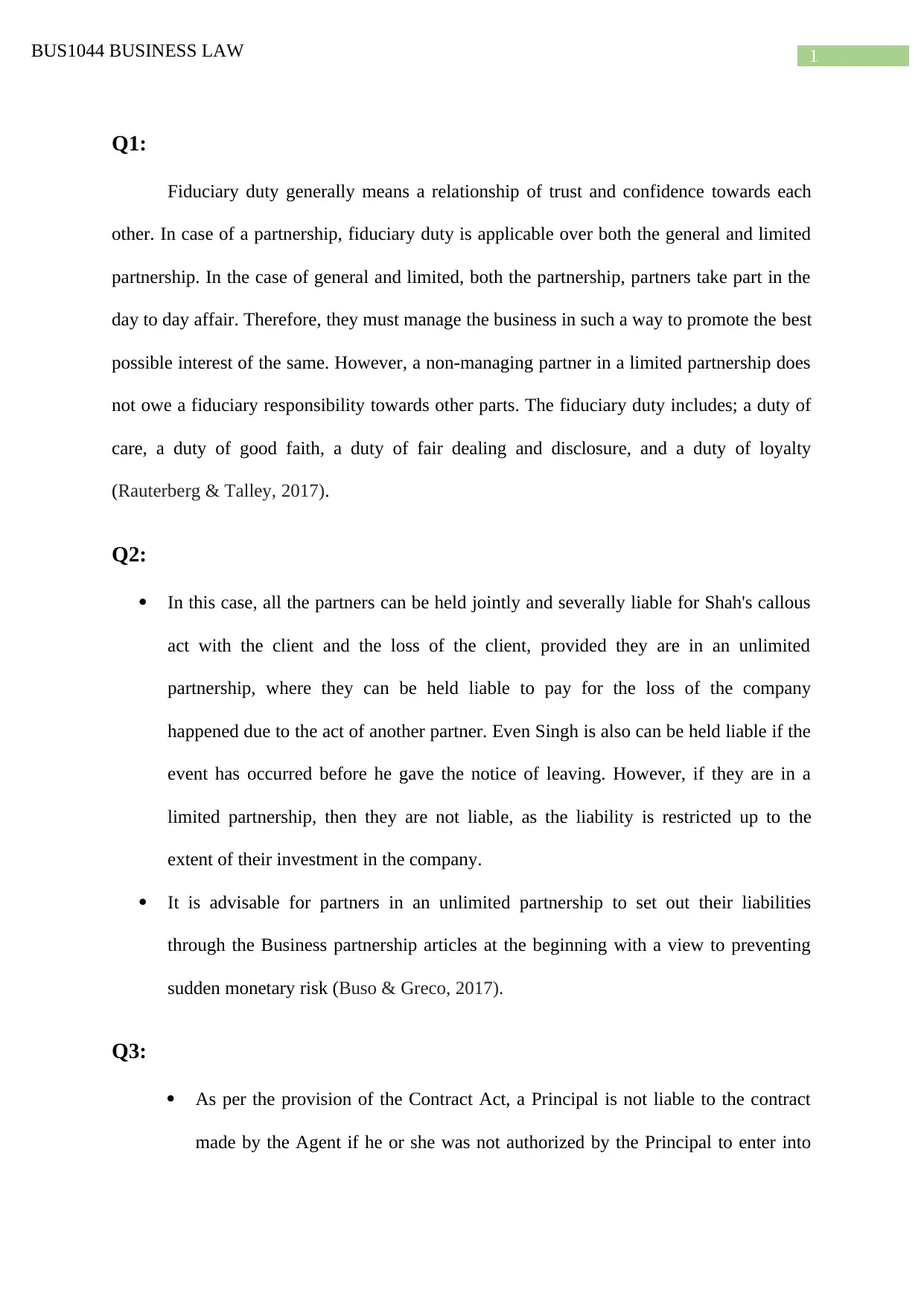
1BUS1044 BUSINESS LAW
Q1:
Fiduciary duty generally means a relationship of trust and confidence towards each
other. In case of a partnership, fiduciary duty is applicable over both the general and limited
partnership. In the case of general and limited, both the partnership, partners take part in the
day to day affair. Therefore, they must manage the business in such a way to promote the best
possible interest of the same. However, a non-managing partner in a limited partnership does
not owe a fiduciary responsibility towards other parts. The fiduciary duty includes; a duty of
care, a duty of good faith, a duty of fair dealing and disclosure, and a duty of loyalty
(Rauterberg & Talley, 2017).
Q2:
In this case, all the partners can be held jointly and severally liable for Shah's callous
act with the client and the loss of the client, provided they are in an unlimited
partnership, where they can be held liable to pay for the loss of the company
happened due to the act of another partner. Even Singh is also can be held liable if the
event has occurred before he gave the notice of leaving. However, if they are in a
limited partnership, then they are not liable, as the liability is restricted up to the
extent of their investment in the company.
It is advisable for partners in an unlimited partnership to set out their liabilities
through the Business partnership articles at the beginning with a view to preventing
sudden monetary risk (Buso & Greco, 2017).
Q3:
As per the provision of the Contract Act, a Principal is not liable to the contract
made by the Agent if he or she was not authorized by the Principal to enter into
Q1:
Fiduciary duty generally means a relationship of trust and confidence towards each
other. In case of a partnership, fiduciary duty is applicable over both the general and limited
partnership. In the case of general and limited, both the partnership, partners take part in the
day to day affair. Therefore, they must manage the business in such a way to promote the best
possible interest of the same. However, a non-managing partner in a limited partnership does
not owe a fiduciary responsibility towards other parts. The fiduciary duty includes; a duty of
care, a duty of good faith, a duty of fair dealing and disclosure, and a duty of loyalty
(Rauterberg & Talley, 2017).
Q2:
In this case, all the partners can be held jointly and severally liable for Shah's callous
act with the client and the loss of the client, provided they are in an unlimited
partnership, where they can be held liable to pay for the loss of the company
happened due to the act of another partner. Even Singh is also can be held liable if the
event has occurred before he gave the notice of leaving. However, if they are in a
limited partnership, then they are not liable, as the liability is restricted up to the
extent of their investment in the company.
It is advisable for partners in an unlimited partnership to set out their liabilities
through the Business partnership articles at the beginning with a view to preventing
sudden monetary risk (Buso & Greco, 2017).
Q3:
As per the provision of the Contract Act, a Principal is not liable to the contract
made by the Agent if he or she was not authorized by the Principal to enter into
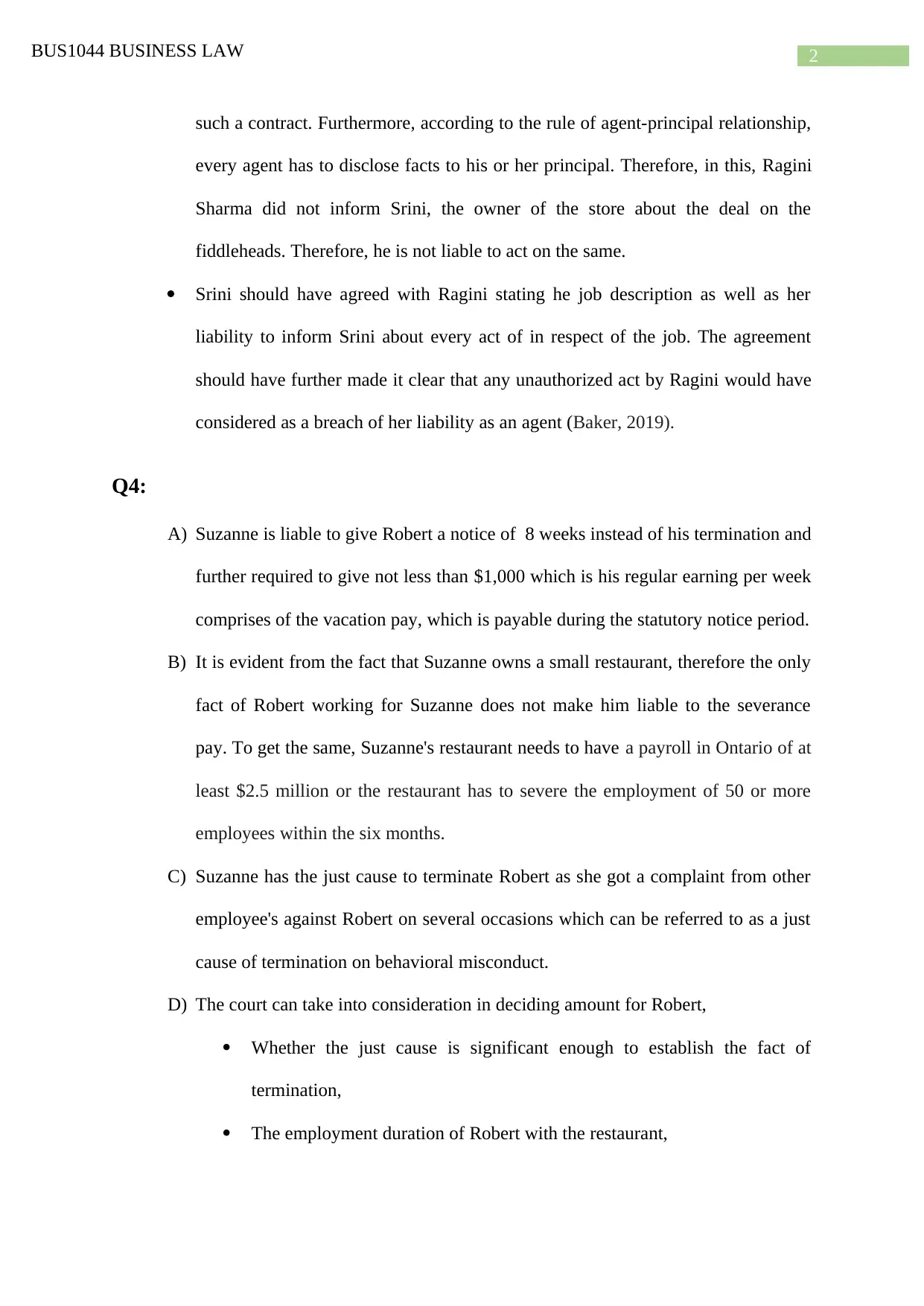
2BUS1044 BUSINESS LAW
such a contract. Furthermore, according to the rule of agent-principal relationship,
every agent has to disclose facts to his or her principal. Therefore, in this, Ragini
Sharma did not inform Srini, the owner of the store about the deal on the
fiddleheads. Therefore, he is not liable to act on the same.
Srini should have agreed with Ragini stating he job description as well as her
liability to inform Srini about every act of in respect of the job. The agreement
should have further made it clear that any unauthorized act by Ragini would have
considered as a breach of her liability as an agent (Baker, 2019).
Q4:
A) Suzanne is liable to give Robert a notice of 8 weeks instead of his termination and
further required to give not less than $1,000 which is his regular earning per week
comprises of the vacation pay, which is payable during the statutory notice period.
B) It is evident from the fact that Suzanne owns a small restaurant, therefore the only
fact of Robert working for Suzanne does not make him liable to the severance
pay. To get the same, Suzanne's restaurant needs to have a payroll in Ontario of at
least $2.5 million or the restaurant has to severe the employment of 50 or more
employees within the six months.
C) Suzanne has the just cause to terminate Robert as she got a complaint from other
employee's against Robert on several occasions which can be referred to as a just
cause of termination on behavioral misconduct.
D) The court can take into consideration in deciding amount for Robert,
Whether the just cause is significant enough to establish the fact of
termination,
The employment duration of Robert with the restaurant,
such a contract. Furthermore, according to the rule of agent-principal relationship,
every agent has to disclose facts to his or her principal. Therefore, in this, Ragini
Sharma did not inform Srini, the owner of the store about the deal on the
fiddleheads. Therefore, he is not liable to act on the same.
Srini should have agreed with Ragini stating he job description as well as her
liability to inform Srini about every act of in respect of the job. The agreement
should have further made it clear that any unauthorized act by Ragini would have
considered as a breach of her liability as an agent (Baker, 2019).
Q4:
A) Suzanne is liable to give Robert a notice of 8 weeks instead of his termination and
further required to give not less than $1,000 which is his regular earning per week
comprises of the vacation pay, which is payable during the statutory notice period.
B) It is evident from the fact that Suzanne owns a small restaurant, therefore the only
fact of Robert working for Suzanne does not make him liable to the severance
pay. To get the same, Suzanne's restaurant needs to have a payroll in Ontario of at
least $2.5 million or the restaurant has to severe the employment of 50 or more
employees within the six months.
C) Suzanne has the just cause to terminate Robert as she got a complaint from other
employee's against Robert on several occasions which can be referred to as a just
cause of termination on behavioral misconduct.
D) The court can take into consideration in deciding amount for Robert,
Whether the just cause is significant enough to establish the fact of
termination,
The employment duration of Robert with the restaurant,
⊘ This is a preview!⊘
Do you want full access?
Subscribe today to unlock all pages.

Trusted by 1+ million students worldwide
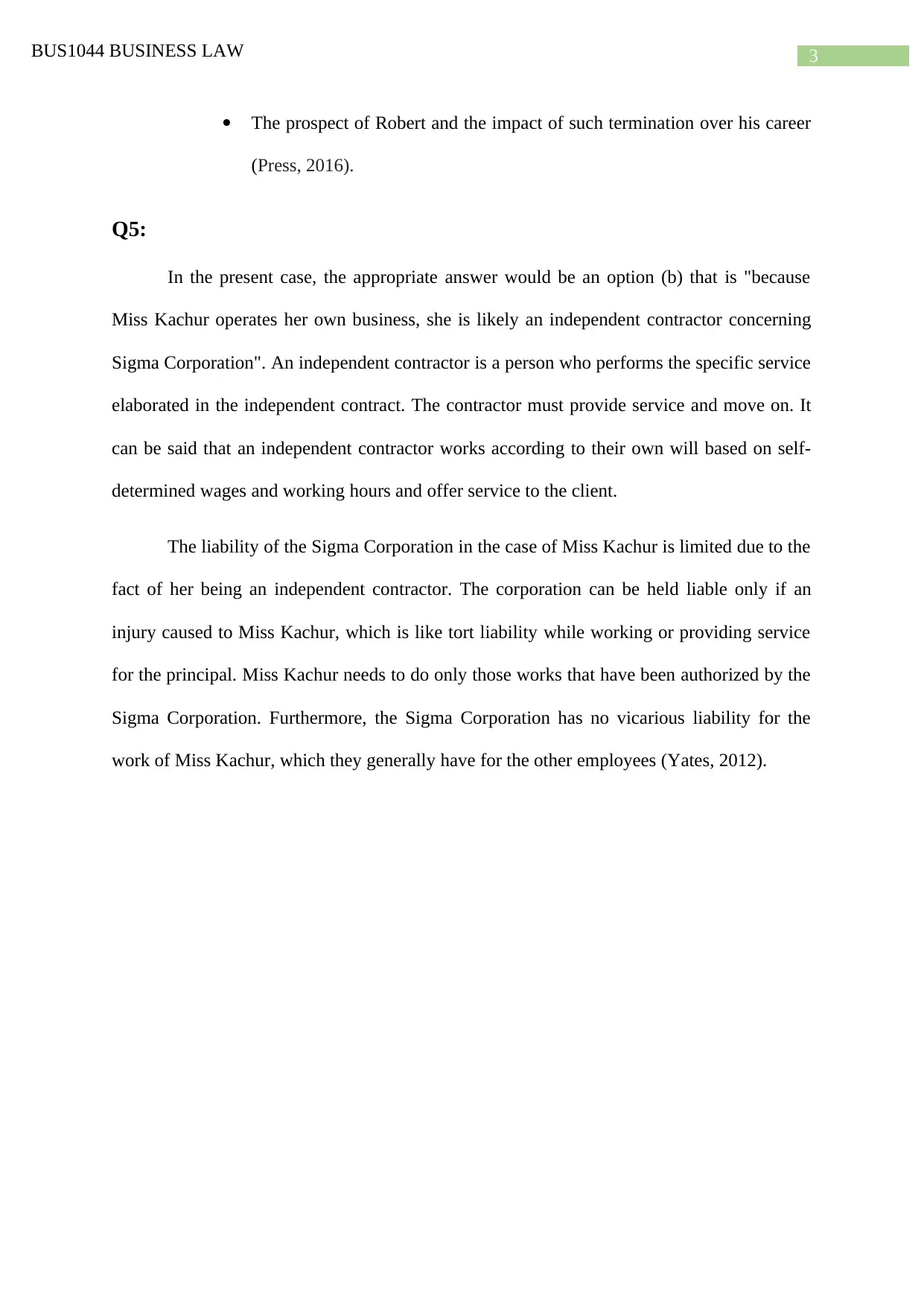
3BUS1044 BUSINESS LAW
The prospect of Robert and the impact of such termination over his career
(Press, 2016).
Q5:
In the present case, the appropriate answer would be an option (b) that is "because
Miss Kachur operates her own business, she is likely an independent contractor concerning
Sigma Corporation". An independent contractor is a person who performs the specific service
elaborated in the independent contract. The contractor must provide service and move on. It
can be said that an independent contractor works according to their own will based on self-
determined wages and working hours and offer service to the client.
The liability of the Sigma Corporation in the case of Miss Kachur is limited due to the
fact of her being an independent contractor. The corporation can be held liable only if an
injury caused to Miss Kachur, which is like tort liability while working or providing service
for the principal. Miss Kachur needs to do only those works that have been authorized by the
Sigma Corporation. Furthermore, the Sigma Corporation has no vicarious liability for the
work of Miss Kachur, which they generally have for the other employees (Yates, 2012).
The prospect of Robert and the impact of such termination over his career
(Press, 2016).
Q5:
In the present case, the appropriate answer would be an option (b) that is "because
Miss Kachur operates her own business, she is likely an independent contractor concerning
Sigma Corporation". An independent contractor is a person who performs the specific service
elaborated in the independent contract. The contractor must provide service and move on. It
can be said that an independent contractor works according to their own will based on self-
determined wages and working hours and offer service to the client.
The liability of the Sigma Corporation in the case of Miss Kachur is limited due to the
fact of her being an independent contractor. The corporation can be held liable only if an
injury caused to Miss Kachur, which is like tort liability while working or providing service
for the principal. Miss Kachur needs to do only those works that have been authorized by the
Sigma Corporation. Furthermore, the Sigma Corporation has no vicarious liability for the
work of Miss Kachur, which they generally have for the other employees (Yates, 2012).
Paraphrase This Document
Need a fresh take? Get an instant paraphrase of this document with our AI Paraphraser
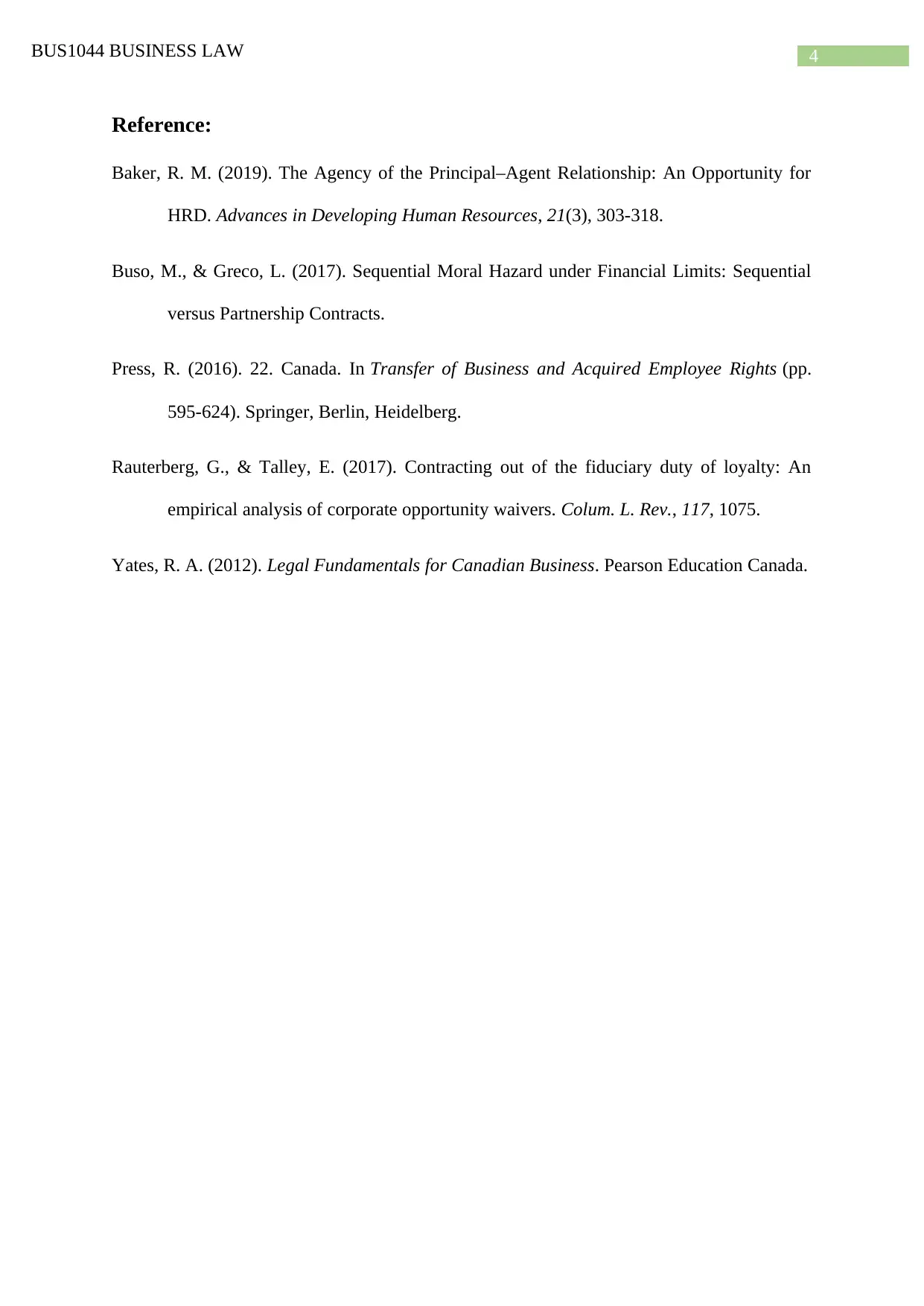
4BUS1044 BUSINESS LAW
Reference:
Baker, R. M. (2019). The Agency of the Principal–Agent Relationship: An Opportunity for
HRD. Advances in Developing Human Resources, 21(3), 303-318.
Buso, M., & Greco, L. (2017). Sequential Moral Hazard under Financial Limits: Sequential
versus Partnership Contracts.
Press, R. (2016). 22. Canada. In Transfer of Business and Acquired Employee Rights (pp.
595-624). Springer, Berlin, Heidelberg.
Rauterberg, G., & Talley, E. (2017). Contracting out of the fiduciary duty of loyalty: An
empirical analysis of corporate opportunity waivers. Colum. L. Rev., 117, 1075.
Yates, R. A. (2012). Legal Fundamentals for Canadian Business. Pearson Education Canada.
Reference:
Baker, R. M. (2019). The Agency of the Principal–Agent Relationship: An Opportunity for
HRD. Advances in Developing Human Resources, 21(3), 303-318.
Buso, M., & Greco, L. (2017). Sequential Moral Hazard under Financial Limits: Sequential
versus Partnership Contracts.
Press, R. (2016). 22. Canada. In Transfer of Business and Acquired Employee Rights (pp.
595-624). Springer, Berlin, Heidelberg.
Rauterberg, G., & Talley, E. (2017). Contracting out of the fiduciary duty of loyalty: An
empirical analysis of corporate opportunity waivers. Colum. L. Rev., 117, 1075.
Yates, R. A. (2012). Legal Fundamentals for Canadian Business. Pearson Education Canada.
1 out of 5
Related Documents
Your All-in-One AI-Powered Toolkit for Academic Success.
+13062052269
info@desklib.com
Available 24*7 on WhatsApp / Email
![[object Object]](/_next/static/media/star-bottom.7253800d.svg)
Unlock your academic potential
Copyright © 2020–2026 A2Z Services. All Rights Reserved. Developed and managed by ZUCOL.




